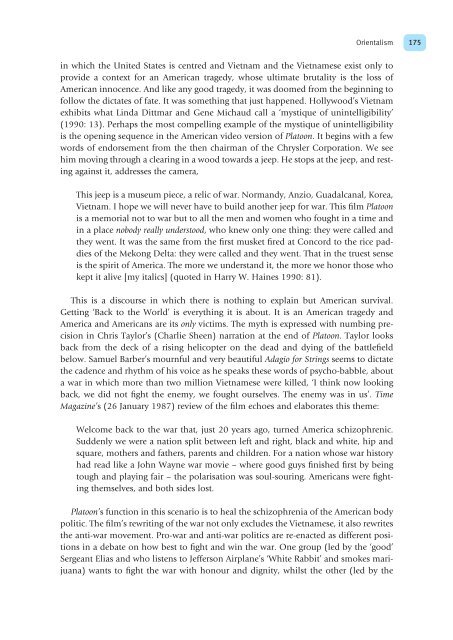Cultural Theory and Popular Culture
Cultural Theory and Popular Culture
Cultural Theory and Popular Culture
You also want an ePaper? Increase the reach of your titles
YUMPU automatically turns print PDFs into web optimized ePapers that Google loves.
Orientalism 175<br />
in which the United States is centred <strong>and</strong> Vietnam <strong>and</strong> the Vietnamese exist only to<br />
provide a context for an American tragedy, whose ultimate brutality is the loss of<br />
American innocence. And like any good tragedy, it was doomed from the beginning to<br />
follow the dictates of fate. It was something that just happened. Hollywood’s Vietnam<br />
exhibits what Linda Dittmar <strong>and</strong> Gene Michaud call a ‘mystique of unintelligibility’<br />
(1990: 13). Perhaps the most compelling example of the mystique of unintelligibility<br />
is the opening sequence in the American video version of Platoon. It begins with a few<br />
words of endorsement from the then chairman of the Chrysler Corporation. We see<br />
him moving through a clearing in a wood towards a jeep. He stops at the jeep, <strong>and</strong> resting<br />
against it, addresses the camera,<br />
This jeep is a museum piece, a relic of war. Norm<strong>and</strong>y, Anzio, Guadalcanal, Korea,<br />
Vietnam. I hope we will never have to build another jeep for war. This film Platoon<br />
is a memorial not to war but to all the men <strong>and</strong> women who fought in a time <strong>and</strong><br />
in a place nobody really understood, who knew only one thing: they were called <strong>and</strong><br />
they went. It was the same from the first musket fired at Concord to the rice paddies<br />
of the Mekong Delta: they were called <strong>and</strong> they went. That in the truest sense<br />
is the spirit of America. The more we underst<strong>and</strong> it, the more we honor those who<br />
kept it alive [my italics] (quoted in Harry W. Haines 1990: 81).<br />
This is a discourse in which there is nothing to explain but American survival.<br />
Getting ‘Back to the World’ is everything it is about. It is an American tragedy <strong>and</strong><br />
America <strong>and</strong> Americans are its only victims. The myth is expressed with numbing precision<br />
in Chris Taylor’s (Charlie Sheen) narration at the end of Platoon. Taylor looks<br />
back from the deck of a rising helicopter on the dead <strong>and</strong> dying of the battlefield<br />
below. Samuel Barber’s mournful <strong>and</strong> very beautiful Adagio for Strings seems to dictate<br />
the cadence <strong>and</strong> rhythm of his voice as he speaks these words of psycho-babble, about<br />
a war in which more than two million Vietnamese were killed, ‘I think now looking<br />
back, we did not fight the enemy, we fought ourselves. The enemy was in us’. Time<br />
Magazine’s (26 January 1987) review of the film echoes <strong>and</strong> elaborates this theme:<br />
Welcome back to the war that, just 20 years ago, turned America schizophrenic.<br />
Suddenly we were a nation split between left <strong>and</strong> right, black <strong>and</strong> white, hip <strong>and</strong><br />
square, mothers <strong>and</strong> fathers, parents <strong>and</strong> children. For a nation whose war history<br />
had read like a John Wayne war movie – where good guys finished first by being<br />
tough <strong>and</strong> playing fair – the polarisation was soul-souring. Americans were fighting<br />
themselves, <strong>and</strong> both sides lost.<br />
Platoon’s function in this scenario is to heal the schizophrenia of the American body<br />
politic. The film’s rewriting of the war not only excludes the Vietnamese, it also rewrites<br />
the anti-war movement. Pro-war <strong>and</strong> anti-war politics are re-enacted as different positions<br />
in a debate on how best to fight <strong>and</strong> win the war. One group (led by the ‘good’<br />
Sergeant Elias <strong>and</strong> who listens to Jefferson Airplane’s ‘White Rabbit’ <strong>and</strong> smokes marijuana)<br />
wants to fight the war with honour <strong>and</strong> dignity, whilst the other (led by the
















